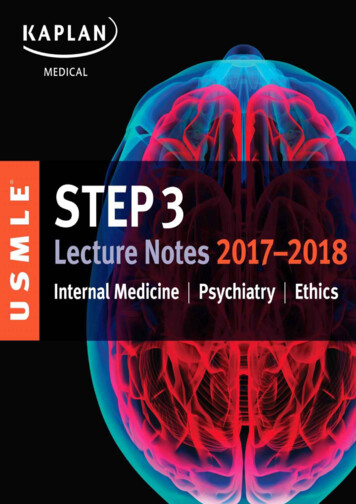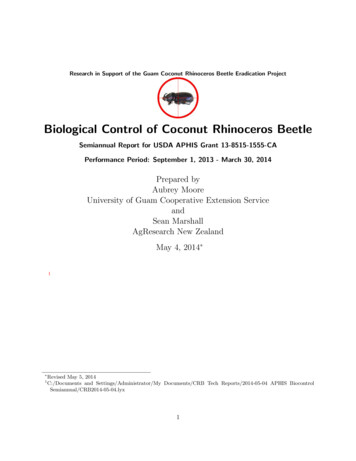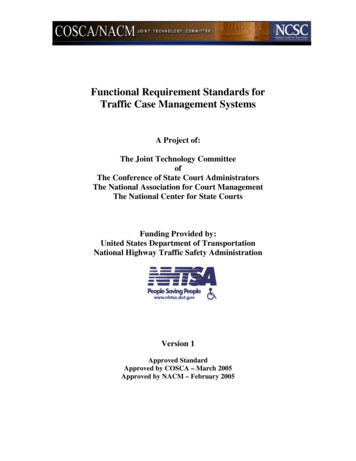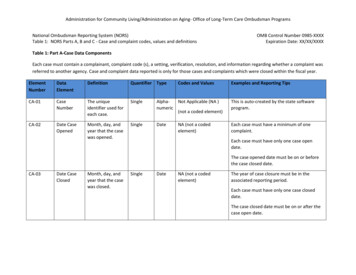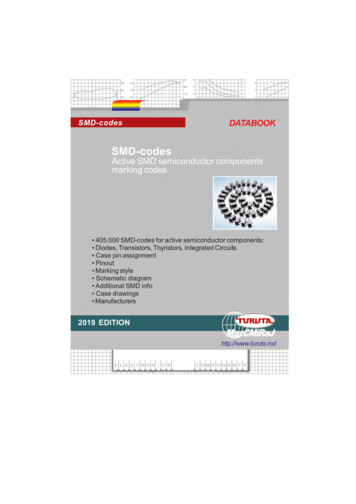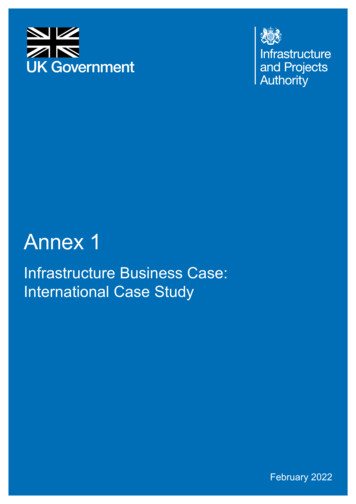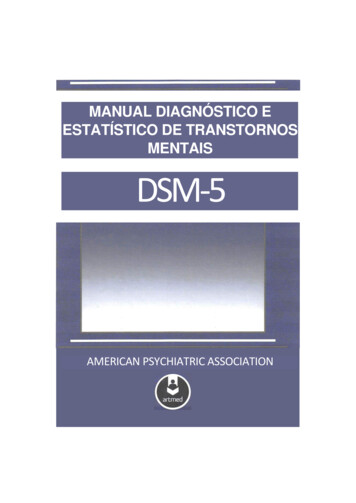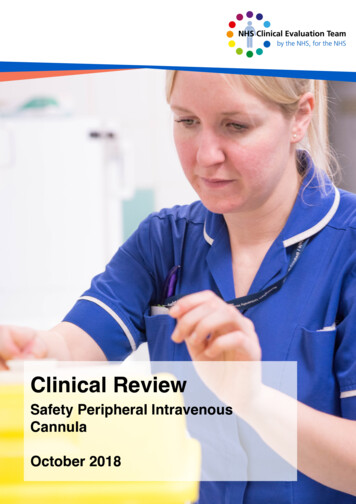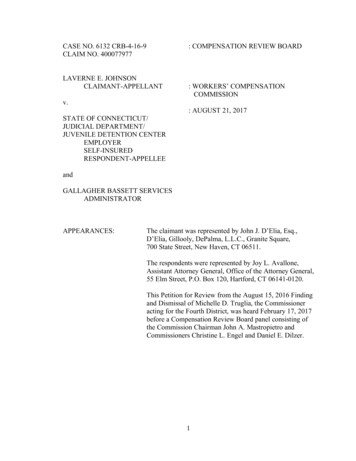
Transcription
CASE NO. 6132 CRB-4-16-9CLAIM NO. 400077977: COMPENSATION REVIEW BOARDLAVERNE E. JOHNSONCLAIMANT-APPELLANTv.STATE OF CONNECTICUT/JUDICIAL DEPARTMENT/JUVENILE DETENTION CENTEREMPLOYERSELF-INSUREDRESPONDENT-APPELLEE: WORKERS’ COMPENSATIONCOMMISSION: AUGUST 21, 2017andGALLAGHER BASSETT SERVICESADMINISTRATORAPPEARANCES:The claimant was represented by John J. D’Elia, Esq.,D’Elia, Gillooly, DePalma, L.L.C., Granite Square,700 State Street, New Haven, CT 06511.The respondents were represented by Joy L. Avallone,Assistant Attorney General, Office of the Attorney General,55 Elm Street, P.O. Box 120, Hartford, CT 06141-0120.This Petition for Review from the August 15, 2016 Findingand Dismissal of Michelle D. Truglia, the Commissioneracting for the Fourth District, was heard February 17, 2017before a Compensation Review Board panel consisting ofthe Commission Chairman John A. Mastropietro andCommissioners Christine L. Engel and Daniel E. Dilzer.1
OPINIONJOHN A. MASTROPIETRO, CHAIRMAN. This case involves a circumstancewherein the claimant presented a dispute to this commission regarding a medical careplan authorized under § 31-279(c) and § 31-279(d) C.G.S.,1 yet neither the claimant northe respondent submitted into the record the only documentary evidence that was relevantto the dispute. In the absence of having the utilization review decision denying theclaimant’s surgery submitted as evidence, the trial commissioner dismissed the claim.The claimant has appealed, arguing that she was entitled to a de novo review of thedecision, which the trial commissioner’s evidentiary rulings thwarted. The respondent1Section 31-279(c) C.G.S. (Rev. to 2009) states: “(1) Any employer or any insurer acting on behalf of anemployer, may establish a plan, subject to the approval of the chairman of the Workers’ CompensationCommission under subsection (d) of this section, for the provision of medical care that the employerprovides for treatment of any injury or illness under this chapter. Each plan shall contain such informationas the chairman shall require, including, but not limited to:(A) A listing of all persons who will provide services under the plan, along with appropriate evidence thateach person listed has met any licensing, certification or registration requirement necessary for the personto legally provide the service in this state;(B) A listing of all pharmacies that will provide services under the plan, to which the employer, any insureracting on behalf of the employer, or any other entity acting on behalf of the employer or insurer shall makedirect payments for any prescription drug prescribed by a physician participating in the plan;(C) A designation of the times, places and manners in which the services will be provided;(D) A description of how the quality and quantity of medical care will be managed; and(E) Such other provisions as the employer and the employees may agree to, subject to the approval of thechairman.(2) The election by an employee covered by a plan established under this subsection to obtain medical careand treatment from a provider of medical services who is not listed in the plan shall suspend theemployee’s right to compensation, subject to the order of the commissioner.”Section 31-279(d) C.G.S. (Rev. to 2009) states: “Each plan established under subsection (c) of thissection shall be submitted to the chairman for his approval at least one hundred twenty days before theproposed effective date of the plan and each approved plan, along with any proposed changes therein, shallbe resubmitted to the chairman every two years thereafter for reapproval. The chairman shall approve ordisapprove such plans on the basis of standards established by the chairman in consultation with a medicaladvisory panel appointed by the chairman. Such standards shall include, but not be limited to: (1) Theability of the plan to provide all medical and health care services that may be required under this chapter ina manner that is timely, effective and convenient for the employees; (2) the inclusion in the plan of allcategories of medical service and of an adequate number of providers of each type of medical service inaccessible locations to ensure that employees are given an adequate choice of providers; (3) the provisionin the plan for appropriate financial incentives to reduce service costs and utilization without a reduction inthe quality of service; (4) the inclusion in the plan of fee screening, peer review, service utilization reviewand dispute resolution procedures designed to prevent inappropriate or excessive treatment; and (5) theinclusion in the plan of a procedure by which information on medical and health care service costs andutilization will be reported to the chairman in order for him to determine the effectiveness of the plan.”2
argues that although the claimant appealed the denial of her claim for surgery, her failureto submit the actual decision into evidence negated its obligation to present this evidence.Upon review, while we are frustrated that the formal hearing did not result in a decisionon the merits, we conclude that the trial commissioner was not provided with a recordfrom the underlying proceeding that would have enabled her to determine whether thedenial of medical treatment was “unreasonable, arbitrary or capricious” as per Admin.Reg. § 31-279-10(f) C.G.S. 2 We conclude that Admin. Reg. §§ 31-279-10(e) and (f)C.G.S. place the burden of persuasion upon the claimant, and as the record presented didnot present a prima facie case that the respondent was in violation of the statute, the trialcommissioner had no choice but to dismiss this claim.32Admin. Reg. § 31-279-10(f) C.G.S. (Rev. to 2009) states: “The necessity and appropriateness of medicaland health care services recommended by providers of a medical care plan shall not be subject to review bya Workers’ Compensation Commissioner until the plan’s utilization review and dispute resolution reviewand appeal procedures, as described in subsection (e) have been exhausted. The decision of the chiefexecutive officer of the plan relating to payment for such medical and health care services shall be subjectto modification only upon showing that it was unreasonable, arbitrary or capricious.”3Admin. Reg. § 31-279-10(e) C.G.S. (Rev. to 2009) states: “(e) Each medical care plan shall includeprovision for both a service utilization review providing a method to evaluate the necessity andappropriateness of medical and health care services recommended by a provider, and a means of disputeresolution if payment for such medical and health care services is denied. Such service utilization reviewand dispute resolution shall include, at a minimum, the following review and appeal procedures:(1) Initiation of a review by any one or more of the following parties: the employee, the provider, theemployer, or the medical care plan itself, either directly or through a utilization review contractor. If aparty other than the plan initiates the review, such party shall supply to the plan all information in itspossession which is relevant to the review. The plan may also request such information as it deemsnecessary to conduct the review.(2) Upon receipt of all proffered and requested information, the plan shall review such recommendedtreatment, utilizing written clinical criteria which have been established by the plan and periodicallyevaluated by appropriate providers of medical and health care services required under Chapter 568 of theConnecticut General Statutes.(3) Not more than two (2) business days after receipt of all such information, the plan shall provide writtennotice to the provider and employee of its determination regarding the recommended treatment. Anywritten notice of a determination not to certify an admission, service, procedure or extension of stay shallinclude the reasons therefore and the name and telephone number of the person to contact with regard to anappeal. The provider and the employee shall also be provided with a copy of the written review and appealprocedures.(4) The provider or the employee may, within fifteen (15) days of the written notice of determination,notify the plan of his or her intent to appeal a determination to deny payment for the recommendedtreatment.3
The circumstances of the present matter are recounted in the trial commissioner’sAugust 15, 2016 Finding and Dismissal. The sole issue was whether the decision of therespondent’s utilization review committee to deny the claimant’s requested left shouldersurgery was “unreasonable, arbitrary or capricious.” The commissioner tookadministrative notice of a voluntary agreement approved by the Commission on May 20,2010, and noted that the parties agreed to bifurcate the proceedings and address aForm 36, filed on April 13, 2016, relative to whether the claimant could return to regularduty work, separately. The record closed on the day of the formal hearing, August 15,2016. At that hearing, the claimant refused to enter into evidence the relevant utilizationreview decision, which she complains was either unreasonable, arbitrary, or capricious,or any supporting medical documentation, on the grounds that the decision favored onlythe respondent’s position. The claimant attempted to introduce additional evidencesupportive of her claim which was outside the utilization review procedure, and the(5) Upon such appeal, the plan shall provide, at the request of the employee or provider, a practitioner in aspecialty relating to the employee’s condition for the purpose of reviewing the plan’s initial decision.(6) Within fifteen (15) days of the request for such review and submission of any further documentationregarding the review, the reviewing practitioner shall submit his opinion regarding such recommendedtreatment to the medical director of the medical care plan who shall, within fifteen (15) days thereafter,render a written decision regarding such treatment.(7) The employee, the provider or the employer may request a further review of the medical director’swritten decision; such request for further review shall be in writing and shall be submitted to the chiefexecutive officer of the medical care plan within fifteen (15) days of the medical director’s writtendecision. The party requesting further review shall have an opportunity for a hearing if such party requestsit in writing and may, at such party’s expense, produce whatever written support or oral testimony it wishesat any such hearing. Such hearing shall be conducted within fifteen (15) days of the written requesttherefore. The chief executive officer of the medical care plan shall make any final determination of suchrequest for further review and may utilize an advisory committee to assist him in his determination. Thechief executive officer shall issue a final written decision on the request for further review as soon aspractical but, in any event, within thirty (30) days of the later of the date of submission of the writtenrequest for such review or the date of conclusion of the hearing requested as part of such review.(8) In the case of an emergency condition, an employee or his representative shall be provided a minimumof twenty-four (24) hours following an admission, service or procedure to request certification andcontinuing treatment for that emergency condition before a utilization determination is made. If adetermination is made not to provide such continuing treatment and the employee or his representative, theprovider, or the employer requests a review of such determination, an expedited review shall be conductedby the medical director and a final decision rendered within two (2) days of the request for review.”4
respondent filed a timely objection. The trial commissioner sustained the objection. Inlight of the fact that the claimant put no evidence into the record, the respondent declinedto offer any evidence of its own. Based on this record, the trial commissioner concludedas follows:A. The objections by respondents to the submission of testimonial anddocumentary evidence outside of the Utilization Reviewcommittee record sought to preclude the introduction of evidenceat the present trial based upon the fact that such evidence couldhave been presented by the claimant to the Utilization Reviewcommittee during the pendency of her appeal, but was not, and thatit is prejudicial to the Utilization Review process to challenge itsdecision based on testimonial and documentary evidence it neversaw or heard prior to the rendering of its final decision.B. The claimant has not met her burden of showing that the decisionrendered by the respondent’s Utilization Review committee waseither unreasonable, arbitrary or capricious, principally on thegrounds that she has submitted no evidence in support of her claim.August 15, 2016 Finding and Dismissal.The trial commissioner dismissed the claim. The claimant filed a Motion toCorrect, seeking to replace the findings with findings supportive of a conclusion that therespondent’s utilization review process was inadequate. The trial commissioner deniedthis motion in its entirety and the claimant has pursued this appeal.The gravamen of the claimant’s appeal is that the trial commissioner failed tohold a de novo proceeding relative to the propriety of the respondent’s utilization reviewprocess, instead choosing to focus on whether the record generated, as a result of thatprocess, comported with the requirements of our statute and our regulations. As theclaimant views the statute, she had the right to proceed to seek approval for medicaltreatment from the commissioner in exactly the same manner as if there had been nomedical care plan in effect. She cites the decision in Figueroa v. Rockbestos Co.,5
4633 CRB-1-03-2 (July 20, 2004), as authority for this position. We have reviewedFigueroa and are not persuaded by this argument.In Figueroa, the respondent appealed from a trial commissioner’s decisionreversing a determination pursuant to a utilization review process that the claimant shouldbe denied surgery. In reaching that decision, the trial commissioner considered evidenceoutside the record which had been presented to the respondent’s chief executive officer,who made the final decision to deny surgery. We ordered the matter remanded, noting inpart:We also cannot tell how much weight, if any, the trier placed onthe additional evidence that was not before the CEO at the time ofhis decision. Therefore, we believe that this matter should beremanded to the trial commissioner for a reconsideration of hisconclusion that the CEO’s denial of surgery was unreasonable.We note that, on remand, the trier must limit his consideration ofmedical evidence to the reports and data that were previouslysubmitted to Borgia in determining whether his denial of surgerywas reasonable.Id.The claimant in this case argues that it was error for the trial commissioner torefuse to admit evidence which the claimant had not presented during the utilizationreview process. The precedent established by Figueroa indicates that had the trialcommissioner admitted this evidence, it would have gone beyond the scope of what theformal hearing on this issue should have considered, which was whether the decisionreached by the respondent on the record presented in its review, was unreasonable,arbitrary or capricious. In Figueroa, the Compensation Review Board engaged in adetailed examination of the text of the regulations governing the utilization review6
process, and determined that a trial commissioner was essentially bound to consider onlythe record generated in the proceedings held by the medical care plan.By allowing modification of a CEO’s decision regarding paymentfor recommended treatment only upon a showing that the decisionwas unreasonable, arbitrary or capricious, the drafters of Admin.Reg. § 31-279-10 presumably intended to grant substantialdeference to the decisionmaker. The claimant nonethelesscontends that the language of § 31-279-10(f) may not abridge atrial commissioner’s power to exercise his traditional factfindingauthority over the credibility of the medical evidence in a workers’compensation case. Although the regulation seems to allocate thatfactfinding authority to the medical plan’s CEO as part of thedispute resolution process, the claimant argues that allowing suchan individual to act as the ultimate factfinder concerning medicaltreatment would defeat the humanitarian purpose of the Workers’Compensation Act by substituting an interested party for animpartial judge.Id.The Appellate Court reached a similar decision in its sole opinion considering thisstatute, Byrd v. Bechtel/Fusco, 90 Conn. App. 641 (2005). In that case, the plaintiffsought a review of the entire utilization review process of the plan managed by therespondent’s plan administrator. The commissioner determined that he lacked thejurisdiction to consider the claims presented by the claimant. The Appellate Courtaffirmed that decision, stating that “the commissioner does not have jurisdiction to hearthe [claimant’s] claims regarding alleged improprieties in the administration of themanaged care plan.” Id., 648.We note that in a case where a managed care plan is not involved and aninsurance carrier fails to authorize surgery or other treatment, it is the claimant who is themoving party before our Commission to demonstrate that the treatment sought is7
reasonable or necessary as defined by § 31-294d(a)(1) C.G.S.4 See Cervero v. Mory’sAssn., Inc., 122 Conn. App. 82 (2010), cert. denied, 298 Conn. 908 (2010). Our reviewof the regulations herein does not suggest that the burden of persuasion has been shiftedto the respondent under managed care plans.Figueroa does stand for the proposition that our review cannot go beyond thescope of the record the parties generated during the utilization review process. In someways, this can be compared to the process a trial commissioner must utilize subsequent togranting a claimant preclusion pursuant to § 31-294c(b) C.G.S. 5 In preclusion cases, thetrial commissioner must determine if the claimant’s evidence as to causation establishes aSection 31-294d(a)(1) C.G.S. (Rev. to 2009) states, in pertinent part: “The employer, as soon as theemployer has knowledge of an injury, shall provide a competent physician or surgeon to attend the injuredemployee and, in addition, shall furnish any medical and surgical aid or hospital and nursing service,including medical rehabilitation services and prescription drugs, as the physician or surgeon deemsreasonable or necessary.”5Section 31-294c(b) C.G.S. (Rev. to 2009) states: “Whenever liability to pay compensation is contested bythe employer, he shall file with the commissioner, on or before the twenty-eighth day after he has receiveda written notice of claim, a notice in accord with a form prescribed by the chairman of the Workers'Compensation Commission stating that the right to compensation is contested, the name of the claimant,the name of the employer, the date of the alleged injury or death and the specific grounds on which theright to compensation is contested. The employer shall send a copy of the notice to the employee inaccordance with section 31-321. If the employer or his legal representative fails to file the notice contestingliability on or before the twenty-eighth day after he has received the written notice of claim, the employershall commence payment of compensation for such injury or death on or before the twenty-eighth day afterhe has received the written notice of claim, but the employer may contest the employee's right to receivecompensation on any grounds or the extent of his disability within one year from the receipt of the writtennotice of claim, provided the employer shall not be required to commence payment of compensation whenthe written notice of claim has not been properly served in accordance with section 31-321 or when thewritten notice of claim fails to include a warning that (1) the employer, if he has commenced payment forthe alleged injury or death on or before the twenty-eighth day after receiving a written notice of claim, shallbe precluded from contesting liability unless a notice contesting liability is filed within one year from thereceipt of the written notice of claim, and (2) the employer shall be conclusively presumed to have acceptedthe compensability of the alleged injury or death unless the employer either files a notice contestingliability on or before the twenty-eighth day after receiving a written notice of claim or commences paymentfor the alleged injury or death on or before such twenty-eighth day. An employer shall be entitled, if heprevails, to reimbursement from the claimant of any compensation paid by the employer on and after thedate the commissioner receives written notice from the employer or his legal representative, in accordancewith the form prescribed by the chairman of the Workers' Compensation Commission, stating that the rightto compensation is contested. Notwithstanding the provisions of this subsection, an employer who fails tocontest liability for an alleged injury or death on or before the twenty-eighth day after receiving a writtennotice of claim and who fails to commence payment for the alleged injury or death on or before suchtwenty-eighth day, shall be conclusively presumed to have accepted the compensability of the allegedinjury or death.”48
prima facie case for benefits. See Wilson v. Capitol Garage, Inc., 6109 CRB-2-16-6(May 16, 2017), citing Donahue v. Veridiem, Inc., 291 Conn. 537 (2009). If the recordof the utilization review process yields an outcome which is not unreasonable, arbitraryor capricious, the decision, as per Admin. Reg. § 31-279-10(f), should be upheld.While the trial commissioner had the obligation, pursuant to Byrd and Figueroa,to ascertain whether the manner in which the managed care plan was administered in theinstant case was unreasonable, arbitrary or capricious, we note that in the absence of anyevidence presented by the claimant, the commissioner could not meet that obligation.Although the respondent, whose judgment had been questioned in this matter, had anopportunity to vindicate its actions and the interest in vindicating its actions, it chose notto present the single piece of evidence, the record of the utilization review appeal, whichwould have established that its decision was reasonable. Our holding in Figueroa speaksto providing due process to both parties in disputes before our tribunal. 6 When relevant6We look to the following sections of Figueroa v. Rockbestos Co., 4633 CRB-1-03-2 (July 20, 2004) forguidance: “We remind the claimant that, as an administrative review body, this board lacks the authority tohold that § 31-279-10(f) is invalid based on constitutional principles of due process. Insofar as theregulation sets forth a standard of review, we must apply it as written. However, our inability to adjudicatethe constitutionality of laws does not obscure our awareness of due process issues in our efforts to applythose laws. See Melendez v. Valley Metallurgical, 4178 CRB-2-00-1 (May 1, 2001). An injured workerhas a substantial interest in obtaining medical treatment for a work-related injury, and our Workers’Compensation Act is designed to protect that right. Giaimo v. New Haven, 257 Conn. 481, 512 (2001),citing Mathews v. Eldridge, 424 U.S. 319, 335 (1976). Due process concepts therefore remain relevant,especially when one considers that the terms ‘unreasonable,’ ‘arbitrary’ and ‘capricious’ are by definitionvague terms that refer to decisions made in the absence of due process . It follows that a commissionermust be able to review the decision of a medical care plan in order to ensure that clearly erroneous factualfindings are corrected, and the correct legal standards have been applied. See Giaimo, supra (due processrequired commissioner to be able to review medical panel decision to correct clear factual errors andmistakes of law).Unlike a hearing before an impartial government body whose procedures are designed by law to protectthe rights of both parties; see, e.g., Rosado v. Bridgeport Roman Catholic Diocesan Corp., 77 Conn. App.690, 713 (2003)(procedural due process guarantees fundamental fairness); the dispute resolution process setforth in Admin. Reg. § 31-279-10(e) involves decision making by both agents of the medical care plan andprivate, for-profit utilization review companies. The presumption of impartiality that accompanies agovernmental decision is therefore absent under the regulatory process. Accordingly, it falls on the trialcommissioner and this agency to scrutinize the dispute resolution review process that the medical care plan9
evidence is withheld from consideration due to tactical considerations, it can result asituation in which the ultimate outcome does not comport with the spirit of our statutes,especially § 31-278 C.G.S. 7 and § 31-298 C.G.S. 8We also note that the claimant’s strategy in the present case yielded anunfavorable result, and the trial commissioner’s decision on evidentiary issues, whileconsistent with the holding in Figueroa, kept evidence the claimant deemed relevant outof the record. However, as an appellate panel, we may not intercede on that issue at thisjuncture. We find our precedent in Barichko v. State/Department of Transportation, 5813has followed in determining whether a medical care plan’s decision is unreasonable, arbitrary orcapricious.” (Internal citation omitted.)7Section 31-278 C.G.S. (Rev. to 2009) states, in pertinent part: “Each commissioner shall, for thepurposes of this chapter, have power to summon and examine under oath such witnesses, and may directthe production of, and examine or cause to be produced or examined, such books, records, vouchers,memoranda, documents, letters, contracts or other papers in relation to any matter at issue as he may findproper, and shall have the same powers in reference thereto as are vested in magistrates taking depositionsand shall have the power to order depositions pursuant to section 52-148. He shall have power to certify toofficial acts and shall have all powers necessary to enable him to perform the duties imposed upon him bythe provisions of this chapter. Each commissioner shall hear all claims and questions arising under thischapter in the district to which the commissioner is assigned and all such claims shall be filed in the districtin which the claim arises, provided, if it is uncertain in which district a claim arises, or if a claim arises outof several injuries or occupational diseases which occurred in one or more districts, the commissioner towhom the first request for hearing is made shall hear and determine such claim to the same extent as if itarose solely within his own district.” (Emphasis added.)8Section 31-298 C.G.S. (Rev. to 2009) states: “Both parties may appear at any hearing, either in person orby attorney or other accredited representative, and no formal pleadings shall be required, beyond anyinformal notices that the commission approves. In all cases and hearings under the provisions of thischapter, the commissioner shall proceed, so far as possible, in accordance with the rules of equity. He shallnot be bound by the ordinary common law or statutory rules of evidence or procedure, but shall makeinquiry, through oral testimony, deposition testimony or written and printed records, in a manner that isbest calculated to ascertain the substantial rights of the parties and carry out the provisions and intent ofthis chapter. No fees shall be charged to either party by the commissioner in connection with any hearingor other procedure, but the commissioner shall furnish at cost (1) certified copies of any testimony, awardor other matter which may be of record in his office, and (2) duplicates of audio cassette recordings of anyformal hearings. Witnesses subpoenaed by the commissioner shall be allowed the fees and travelingexpenses that are allowed in civil actions, to be paid by the party in whose interest the witnesses aresubpoenaed. When liability or extent of disability is contested by formal hearing before the commissioner,the claimant shall be entitled, if he prevails on final judgment, to payment for oral testimony or depositiontestimony rendered on his behalf by a competent physician, surgeon or other medical provider, includingthe stenographic and videotape recording costs thereof, in connection with the claim, the commissioner todetermine the reasonableness of such charges.” (Emphasis added.)10
CRB-4-12-12 (January 13, 2014) and Gibson v. State/Department of DevelopmentalServices-North Region, 5422 CRB-2-09-2 (January 13, 2010) applicable.In Gibson, we pointed out that as the respondent is the movingparty on the issue of repayment of allegedly overpaid benefits, theyhave the burden of persuasion before this forum. Advocates forrespondents in such cases should not assume that asserting a claimis the functional equivalent of proving a claim, and shouldendeavor to provide all necessary evidence to the trialcommissioner before the record closes. Parties should not proceedunder the belief this appellate body will remedy an unfavorableresult resulting from an advocate’s ineffective factual presentation.As the Appellate Court held in McGuire v. McGuire, 102 Conn.App. 79, 83 (2007), “[w]e have made it clear that we will notpermit parties to anticipate a favorable decision, reserving a rightto impeach it or set it aside if it happens to be against them, for acause which was well known to them before or during the trial.Barichko, supra.In the present case, Figueroa limits the consideration at a formal hearing to therecord which was presented to the respondent during the utilization review process.Consistent with our holding in Barichko, the claimant should have presented her mostpersuasive evidence at that forum. In any event, we further note Val
D'Elia, Gillooly, DePalma, L.L.C., Granite Square, 700 State Street, New Haven, CT 06511. The respondents were represented by Joy L. Avallone, . surgery was "unreasonable, arbitrary or capricious." . produce whatever written support or oral testimony it wishes at any such hearing. Such hearing shall be conducted within fifteen (15 .
